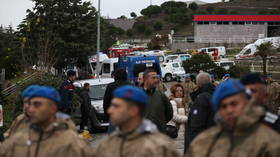Deadly exotic virus stalking southern Russia
The record-high temperatures that gripped Russia this summer have triggered the spread of a tropical disease uncommon in this region. Mosquitoes have carried the deadly West Nile virus to the south of the country.
A study stream of patients has been arriving at a hospital near Volgograd with a diagnosis of West Nile Fever. At least five have already died and 170 are ill, RIA Novosti new agency reported.
“The situation is grave. It has been an unusually hot summer which allows mosquitoes to build a high level of the virus,” said epidemiologist Galina Zabolotina. “There is nothing we can do to totally wipe out this infection.”
The number of those affected may be several times higher. Many people are being treated at home without knowing what is wrong with them, and do not ask for professional medical help until it is too late.
Among the victims of the infection is Ekaterina’s mother.
“If only we had realized what the symptoms were and that we needed to get her to hospital, she might have survived,” said Ekaterina. “My mother was a strong and healthy woman.”
The West Nile Virus affects different people in different ways. For the young, it may pass without symptoms. In fact, approximately 90 per cent of West Nile Virus infections in humans do not exhibit any symptoms.
Others might suffer a mild form of flu.
But for those most seriously affected, for those who are vulnerable, that is, older people, it may be critical.
It is termed West Nile meningitis or encephalitis, its symptoms being headaches, vomiting and diarrhea.
It progressively damages the central nervous system, and eventually leads to death.
West Nile fever is as exotic as it sounds. It is much more typical for countries around the Mediterranean, especially Israel and Egypt.
It was never recorded in Russia until eleven years ago, when there was a particularly hot summer and about 40 people died from the disease.
Doctors are issuing warnings for locals to dress in clothes with long sleeves and legs, and to protect themselves with an anti-mosquito spray.
They say the threat will remain until October when the weather is expected to become cooler.
In the high-risk area there are about 1.5 million people.














